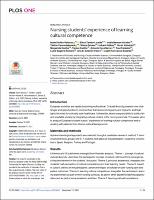Por favor, use este identificador para citar o enlazar este ítem:
https://repositorio.usj.es/handle/123456789/783
| Título : | Nursing students' experience of learning cultural competence |
| Autor: | Antón-Solanas, Isabel



Tambo Lizalbe, Elena 

Hamam-Alcober, Nadia 
Vanceulebroeck, V. 

Dehaes, Shana 
Kalkan, Idrani 


Komurku, Nuran Coelho, Margarida 


Soares-Coelho, Teresa 

Casa-Nova, Antonio 


Cordeiro, Raúl Alberto 


Sagarra-Romero, Lucía 

Subirón-Valera, Ana Belén 

Huércanos-Esparza, Isabel 

|
| Palabras clave : | Education; Undergraduate; Preceptions; Nurses; Equity; Care |
| Fecha de publicación: | 17-dic-2021 |
| Editorial : | Gwo-Jen Hwang, National Taiwan University of Science and Technology, TAIWAN |
| Citación : | Antón-Solanas I, Tambo-Lizalde E , Hamam-Alcober N, Vanceulebroeck V, DehaesS, Kalkan I, et al. (2021) Nursing students’experience of learning cultural competence. PLoSONE 16(12): e0259802. https://doi.org/10.1371/journal.pone.0259802 |
| Resumen : | Introduction European societies are rapidly becoming multicultural. Cultural diversity presents new challenges and opportunities to communities that receive immigrants and migrants, and highlights the need for culturally safe healthcare. Universities share a responsibility to build a fair and equitable society by integrating cultural content in the nursing curricula. This paper aims to analyze European student nurses experience of learning cultural competence and of working with patients from diverse cultural backgrounds. Materials and methods A phenomenological approach was selected through a qualitative research method. 7 semi-structured focus groups with 5-7 students took place at the participants' respective universities in Spain, Belgium, Turkey and Portugal. Results 5 themes and 16 subthemes emerged from thematic analysis. Theme 1, concept of culture/cultural diversity, describes the participants' concept of culture; ethnocentricity emerged as a frequent element in the students' discourse. Theme 2, personal awareness, integrates the students' self-perception of cultural competence and their learning needs. Theme 3, impact of culture, delves on the participants' perceived impact of cultural on both nursing care and patient outcomes. Theme 4, learning cultural competence, integrates the participants' learning experiences as part of their nursing curricula, as part of other academic learning opportunities and as part of extra-academic activities. Theme 5, learning cultural competence during practice placements, addresses some important issues including witnessing unequal care, racism, prejudice and conflict, communication and language barriers, tools and resources and positive attitudes and behaviors witnesses or displayed during clinical practice. Conclusion The participants' perceived level of cultural competence was variable. All the participants agreed that transcultural nursing content should be integrated in the nursing curricula, and suggested different strategies to improve their knowledge, skills and attitudes. It is important to listen to the students and take their opinion into account when designing cultural teaching and learning activities. |
| URI : | https://repositorio.usj.es/handle/123456789/783 |
| ISSN : | 1932-6203 |
| Aparece en las colecciones: | Artículos de revistas |
Ficheros en este ítem:
| Fichero | Descripción | Tamaño | Formato | |
|---|---|---|---|---|
| Nursing students’ experience of learning cultural competence.pdf | 514,8 kB | Adobe PDF |  Visualizar/Abrir |
Este ítem está sujeto a una licencia Creative Commons Licencia Creative Commons

